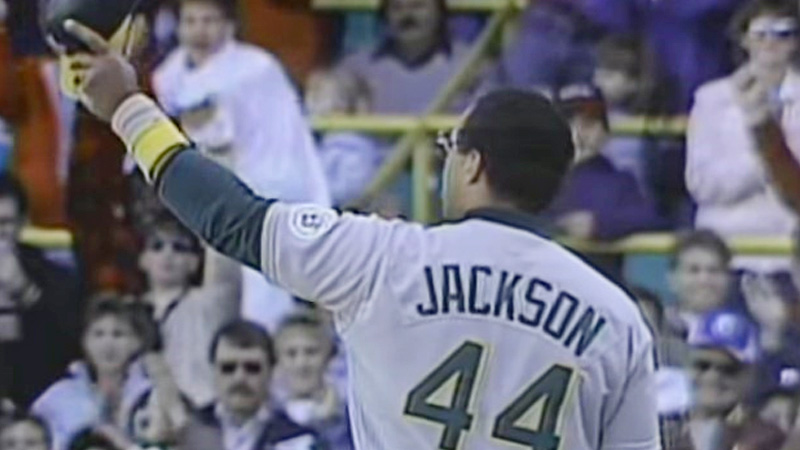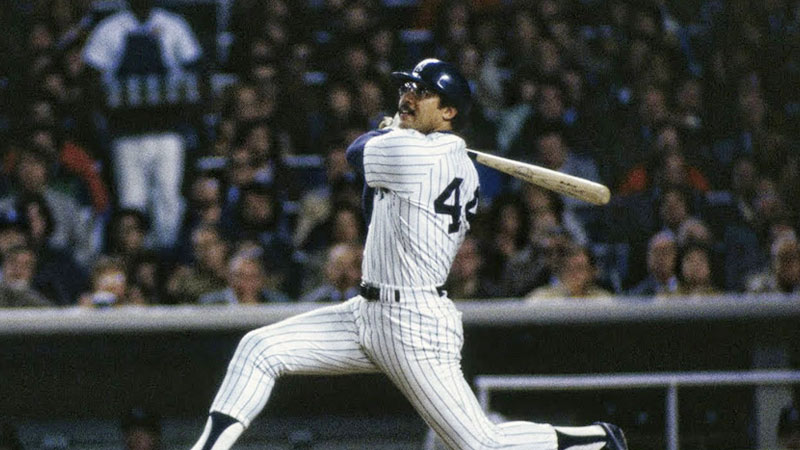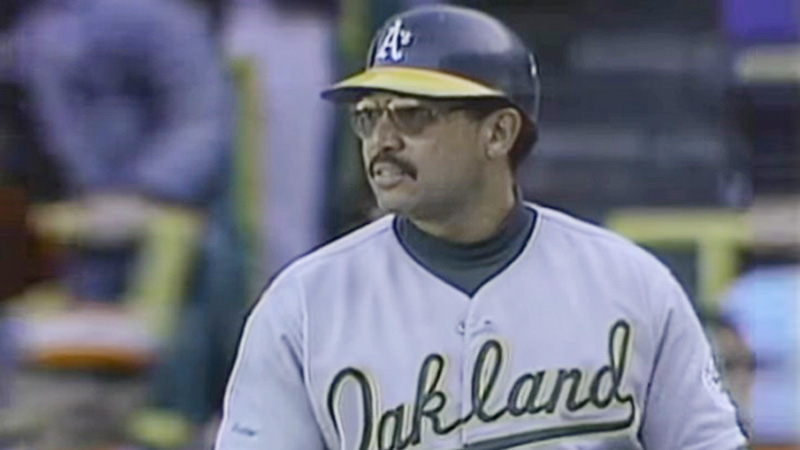Reggie Jackson, a name etched in the annals of Major League Baseball, is widely recognized by a legendary moniker: “Mr. October.”
This nickname, attributed to him by teammate Thurman Munson, is a testament to his remarkable and clutch performances during the sport’s most critical moments.
Reggie Jackson’s impact on the baseball world extends far beyond his three World Series championships and tenacious batting stats.
His enduring legacy as “Mr. October” highlights his ability to thrive under immense pressure, consistently delivering when it matters most.
In this exploration, we delve into the compelling reasons behind why Reggie Jackson earned the enduring title of Mr. October.
The Reasons Why Reggie Jackson Is Called Mr October?
Reggie Jackson is commonly referred to as “Mr. October” due to his remarkable and clutch performances during the Major League Baseball (MLB) postseason, particularly in the World Series.
This nickname, which was coined by his teammate Thurman Munson, has stuck with him throughout his career and has become an enduring part of baseball lore.
Here are the reasons why Reggie Jackson earned the nickname “Mr. October”:
World Series Heroics
Reggie Jackson’s most iconic moments came in the World Series, where he consistently rose to the occasion.
He played in five World Series with three different teams during his career: the Oakland Athletics, the New York Yankees, and the California Angels.
In the 1977 World Series, while playing for the Yankees, he had one of the most memorable performances in baseball history.
Jackson hit three home runs in one game (Game 6) to help clinch the championship for the Yankees. This feat is still referred to as the “Mr. October Game.”
Consistent Playoff Success
Beyond that single famous game, Reggie Jackson consistently delivered in the postseason. He had a career .278 batting average in the World Series, hitting 10 home runs and driving in 24 runs over 27 games.
This level of consistency and clutch hitting on the sport’s biggest stage is one of the primary reasons for his nickname.
Big Personality and Confidence

Reggie Jackson was known for his larger-than-life personality and supreme self-confidence. He thrived under pressure and relished the spotlight.
His swagger and ability to perform in high-stakes situations made him a natural fit for the “Mr. October” nickname.
Impact on Multiple Teams
Reggie Jackson’s success in the postseason wasn’t limited to one team or one era. He won World Series championships with both the Athletics and the Yankees, proving his ability to come through in key moments regardless of where he played.
His versatility and impact on different teams further solidified his status as a postseason legend.
Lasting Legacy
Reggie Jackson’s “Mr. October” nickname has transcended his playing career and is a testament to his enduring legacy in the world of baseball.
Even decades after his retirement, he is still celebrated as one of the greatest postseason performers in the history of the sport.
How Reggie Jackson Earned the Nickname- Mr October?
Reggie Jackson earned the nickname “Mr. October” through a combination of remarkable postseason performances, clutch hitting, and a bit of serendipity.
The nickname was not something he sought, but rather, it was bestowed upon him by his teammate Thurman Munson, and it has since become an enduring part of baseball history.
Remarkable World Series Success
Reggie Jackson’s path to earning the “Mr. October” nickname began with his remarkable success in the World Series, where he consistently performed at an elite level.
He played in five World Series during his career, and his standout moments occurred on baseball’s grandest stage.
In particular, his legendary performance in Game 6 of the 1977 World Series while playing for the New York Yankees elevated him to iconic status.
Jackson’s three home runs in that single game, each off a different pitcher, captured the hearts and imaginations of baseball fans.
Thurman Munson’s Contribution
While Reggie Jackson’s playoff heroics were well-known, it was his teammate Thurman Munson who gave him the nickname “Mr. October.”
Munson, who was the captain of the New York Yankees at the time, came up with the nickname as a way to honor Jackson’s extraordinary ability to shine in the postseason.
Munson’s choice of the name “Mr. October” conveyed the idea that Jackson was at his best during the most crucial moments of the baseball season.
Embracing the Nickname

Reggie Jackson embraced the “Mr. October” nickname and recognized its significance. He didn’t shy away from the spotlight or the pressure of the postseason; instead, he thrived in these high-stakes situations.
Jackson’s ability to maintain his performance level when it mattered most and his self-assured, larger-than-life personality made the nickname a fitting tribute to his postseason prowess.
Enduring Legacy
The “Mr. October” nickname is a testament to Reggie Jackson’s enduring legacy in the world of baseball.
Even decades after his retirement, he is still celebrated as one of the greatest postseason performers in the history of the sport.
His nickname is invoked in discussions of baseball’s most clutch players, and his iconic moments in the World Series are revisited and cherished during every postseason.
Reggie Jackson’s impact on the game and the enduring legacy of “Mr. October” serve as a lasting testament to his remarkable career and his ability to shine when the lights were brightest.
Fan Reactions to Reggie Jackson’s Nickname- Mr. October
Fan reactions to Reggie Jackson’s nickname, “Mr. October,” have been overwhelmingly positive and have contributed to the enduring popularity of the moniker.
Here are some common fan reactions to Reggie Jackson being called “Mr. October”:
Admiration and Respect
Fans have a deep admiration and respect for Reggie Jackson’s ability to perform at the highest level during the most critical moments of the baseball season.
The nickname “Mr. October” reflects his clutch hitting and remarkable postseason success, which resonates with baseball enthusiasts.
Iconic Status
Fans often view Reggie Jackson as an iconic figure in the history of the sport due to his nickname and his exceptional performances in the World Series.
He is celebrated as one of the greatest postseason players, and his legacy as “Mr. October” is firmly established in the minds of fans.
Nostalgia and Fond Memories
For those who witnessed Reggie Jackson’s playing days, the “Mr. October” nickname evokes a sense of nostalgia and brings back fond memories of his extraordinary moments in the World Series.
His three-home-run game in the 1977 World Series remains an enduring image in the minds of many fans.
Baseball Lore and Tradition
The nickname “Mr. October” has become a part of baseball lore and tradition. Fans recognize it as a symbol of excellence in the postseason, and it is frequently invoked during discussions about clutch performers and memorable playoff moments.
Pride in His Accomplishments
Fans of Reggie Jackson take pride in his accomplishments and the recognition he received through the “Mr. October” nickname.
They see it as a well-deserved honor that encapsulates his remarkable career and his ability to rise to the occasion when it mattered most.
Inspiration for New Generations
Reggie Jackson’s nickname continues to inspire new generations of baseball players and fans.
Young players look up to “Mr. October” as a role model for how to excel in high-pressure situations, and fans appreciate his contributions to the game’s history.
FAQS
Was Reggie Jackson’s “Mr. October” nickname officially recognized by the MLB?
No, the “Mr. October” nickname was not officially recognized by Major League Baseball.
It was a nickname bestowed upon Reggie Jackson by his teammate Thurman Munson and became a part of baseball folklore.
Did Reggie Jackson have a say in the nickname “Mr. October”?
Reggie Jackson did not choose the “Mr. October” nickname himself. It was a nickname given to him by Thurman Munson, reflecting his clutch performances in the postseason.
Has any other baseball player been given a similar nickname like “Mr. October”?
While other players have had nicknames associated with their postseason success, such as “Mr. November” for Derek Jeter, none have achieved the same level of recognition and lasting legacy as Reggie Jackson’s “Mr. October.”
What is Reggie Jackson’s career batting average in the World Series?
Reggie Jackson had a career batting average of .357 in the World Series, which ranks among the highest in the history of the Fall Classic.
How did Reggie Jackson feel about the “Mr. October” nickname?
Reggie Jackson embraced the “Mr. October” nickname and recognized it as a symbol of his excellence in the postseason.
He has often spoken about the pride he takes in the moniker and the honor it represents.
Wrap Up
In baseball, Reggie Jackson’s moniker, “Mr. October,” transcends mere nomenclature; it represents a legacy of extraordinary achievement under the most intense pressure.
Jackson earned this nickname through his consistent and clutch performances in the postseason, particularly in the World Series.
His iconic three-home-run game in the 1977 Fall Classic immortalized him in baseball history, but “Mr. October” is more than just a historic moment; it’s a symbol of excellence when it matters most.
Reggie Jackson’s enduring legacy as “Mr. October” remains a testament to his unmatched ability to shine in the brightest lights and continues to inspire generations of players and fans alike.







